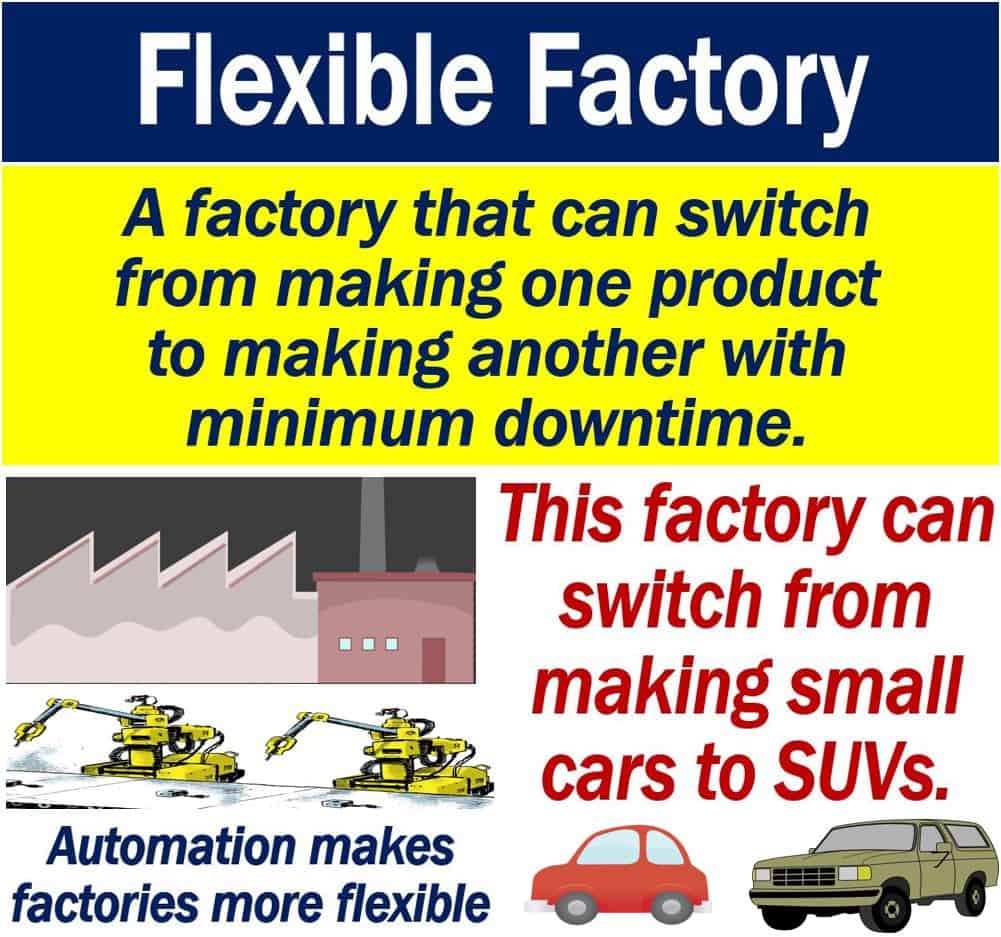A Flexible Factory is a production facility that can rapidly reconfigure to produce different things. A flexible factory can change what it produces at relatively short notice. Hence, the word ‘flexible’ in the term. The creators of the flexible factory deliberately designed it so that it can provide a wide range of operations and services. In other words, with short changeover times, it can operate across many different product lines.
In this article, the word ‘facility’ means ‘factory’.
Most auto plants, i.e., vehicle factories, can switch rapidly from producing one product to another.
The flexible factory contrasts with a focused factory. Focused factories concentrate on a specific set of resources. They provide a narrow range of services or operations. The majority of mass production plants are focused factories.
The Law Dictionary has the following definition of flexible factory:
“A place that is made to do a variety of things and change with demands over time. an auto plant is an example of this.”
Companies that try to become more flexible in a rapidly-changing marketplace use a strategy we call flexible specialization. The have multi-skilled workers and multi-use equipment and machinery.
This evolving landscape of manufacturing, spearheaded by the rise of flexible factories, is also reshaping the skills and training required for the modern workforce.

Flexible factory – a new way
Since the turn of the century, flexible factories have been changing how we produce things.
In the past, production facilities were rigid places. When people built them, they riveted the components to the floor.
In the old days, a factory was a single gigantic machine that made one thing.
However, the demands on the manufacturing industry began to change rapidly. The demand for production facilities with flexibility grew exponentially.
Nowadays, a telephone manufacturer may get an order in today for 200,000 units. Next week, there will be another order for 80,000 units. However, the two orders will be for slightly different telephones.
In the past, retooling the production line for two short runs would have been too expensive. The factory would have done some of the production, and then sent the semi-finished goods elsewhere for completion.
-
Dealing with two different orders
A flexible factory, however, can easily deal with the two telephone orders. It uses assets on its production line that it can rapidly configure to produce varying versions of products.
With the minimum of downtime, flexible factories can switch from making one product to another.
The adaptability of flexible factories contributes significantly to reducing waste and optimizing resource usage, thereby supporting more sustainable manufacturing practices.
Regarding this flexibility, an article in The Economist says:
“This flexibility is the result of progress in both hardware and software.”
“Improved sensors and progress in artificial intelligence, in particular, are making robots more fault-tolerant and safer to be around, saving space and allowing integration into tasks formerly performed by humans only.”
3-D Printing
3-D printing technology today reduces a factory’s reliance on distant suppliers.
What will a sophisticated 3-D printer be able to make in thirty or forty years’ time?
-
The ultimate flexible factory
Will 3-D printers eventually become the ultimate flexible factory?
In other words, will we eventually have one that can make anything? Specifically, anything from a toothpick to an interstellar rocket?
Perhaps, when that day comes, if it does, business as we know it will cease to exist.
What would happen if each home had a 3-D printer that could make anything? We would not need to go out and buy things.
We would not be able to sell anything either. Everybody could get whatever they wanted from their 3-D printer. So, why would they buy anything from us?
Will such economic terms as market forces, demand and supply, etc., become irrelevant?
Video – What is a Flexible Factory?
This video, from our YouTube partner channel – Marketing Business Network – explains what a ‘Flexible Factory’ is using simple and easy-to-understand language and examples.
